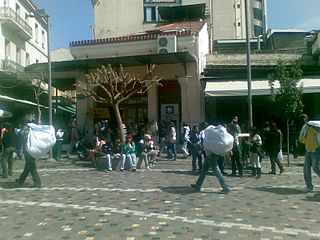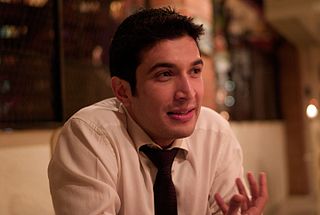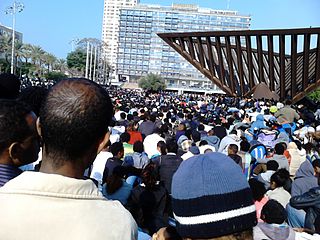Since 1945, immigration to the United Kingdom, controlled by British immigration law and to an extent by British nationality law, has been significant, in particular from the Republic of Ireland and from the former British Empire, especially India, Bangladesh, Pakistan, the Caribbean, South Africa, Nigeria, Ghana, Kenya, and Hong Kong. Since the accession of the UK to the European Communities in the 1970s and the creation of the EU in the early 1990s, immigrants relocated from member states of the European Union, exercising one of the European Union's Four Freedoms. In 2021, since Brexit came into effect, previous EU citizenship's right to newly move to and reside in the UK on a permanent basis does not apply anymore. A smaller number have come as asylum seekers seeking protection as refugees under the United Nations 1951 Refugee Convention.
The West Nile Bank Front (WNBF) was an Ugandan rebel group under the command of Juma Oris.

Afghan refugees are citizens of Afghanistan who were forced to flee their country as a result of wars, persecution, torture or genocide. The 1978 Saur Revolution followed by the 1979 Soviet invasion marked the first major wave of internal displacement and international migration to neighboring Iran and Pakistan; smaller numbers also went to India or to countries of the former Soviet Union. Between 1979 and 1992, more than 20% of Afghanistan's population fled the country as refugees. Following the Soviet withdrawal in 1989, many returned to Afghanistan, however many Afghans were again forced to flee during the civil war in the 90s. Over 6 million Afghan refugees were residing in Iran and Pakistan by 2000. Most refugees returned to Afghanistan following the 2001 United States invasion and overthrow of the Taliban regime. Between 2002 and 2012, 5.7 million refugees returned to Afghanistan, increasing the country's population by 25%.

Foreign nationals (aliens) can violate US immigration laws by entering the United States unlawfully or lawfully entering but then remaining after the expiration of their visas, parole, or temporary protected status. Illegal immigration has been a matter of intense debate in the United States since the 1980s.
African immigrants in Europe are individuals residing in Europe who were born in Africa. This includes both individuals born in North Africa and Sub-Saharan Africa.

Rosarno is a comune (municipality) in the Metropolitan City of Reggio Calabria in the Italian region of Calabria. It is about 70 kilometres (43 mi) southwest of Catanzaro and about 50 kilometres (31 mi) northeast of Reggio Calabria. Rosarno stands on a natural terrace cloaked in olive plantations and vineyards on the left bank of the river Mesima, overlooking the Gioia Tauro plain. The town is an important agricultural and commercial centre known for the production of citrus fruits, olive oil, and wines.
Illegal immigration is the migration of people into a country in violation of that country's immigration laws, or the continuous residence in a country without the legal right to. Illegal immigration tends to be financially upward, from poorer to richer countries. Illegal residence in another country creates the risk of detention, deportation, and/or other sanctions.

Immigration to Greece percentage of foreign populations in Greece is 7.1% in proportion to the total population of the country. Moreover, between 9 and 11% of the registered Greek labor force of 4.4 million are foreigners. Migrants additionally make up 25% of wage and salary earners.

Slavery in Libya has a long history and a lasting impact on the Libyan culture. It is closely connected with the wider context of slavery in North African and trans-Saharan slave trade.
There is a significant population of Zimbabweans in South Africa, making up South Africa's largest group of foreign migrants. Estimates of their numbers range from one to five million.
People Against Suffering, Oppression and Poverty (PASSOP) is a community-based, grass roots non-profit organisation fighting for the rights of asylum seekers, refugees and immigrants in Cape Town, South Africa.

Imran Garda is a South African journalist, presenter, and award-winning novelist. He was the host of The Newsmakers on TRT World. He was formerly the host of Third Rail on Al Jazeera America based in New York City. Garda was also a senior presenter and producer for AJ+, Al Jazeera Media Network's all digital video news channel based in San Francisco. Previously, he worked for Al Jazeera English in Doha, Qatar and Washington, DC. He also hosted the award-winning show The Stream.

Dr. Oussama (Sam) Cherribi is a Moroccan-Dutch sociologist, former politician for The People's Party for Freedom and Democracy (VVD) party, and current professor at Emory University. He was a member of the Dutch House of Representatives from 1994 to 2002.

On 11 July 2010, suicide bombings were carried out against crowds watching a screening of the 2010 FIFA World Cup Final at two locations in Kampala, the capital city of Uganda. The attacks left 74 dead and 85 injured. Al-Shabaab, an Islamist militia based in Somalia that has ties to al-Qaeda, claimed responsibility for the blasts as retaliation for Ugandan support for AMISOM. In March 2015, the trial of 13 Kenyan, Ugandan and Tanzanian alleged perpetrators of the bombings began at the High Court of Uganda.
There are thought to be over half a million undocumented immigrants residing in New York City. They come from many parts of the world, especially Latin America, Asia, Eastern Europe, and the Caribbean. About 70% of them have paid work, in catering, construction, retail, driving, cleaning, and many other trades; at least in catering, their wages tend to be lower than those of comparable workers.

African immigration to Israel is the international movement to Israel from Africa of people that are not natives or do not possess Israeli citizenship in order to settle or reside there. This phenomenon began in the second half of the 2000s, when a large number of people from Africa entered Israel, mainly through the then-lightly fenced border between Israel and Egypt in the Sinai Peninsula. According to the data of the Israeli Interior Ministry, 26,635 people arrived illegally in this way by July 2010, and over 55,000 by January 2012. In an attempt to curb the influx, Israel constructed the Egypt–Israel barrier. Since its completion in December 2013, the barrier has almost completely stopped the immigration of Africans into Israel across the Sinai border.
Illegal immigration to South Africa refers to migration of foreign nationals to South Africa without the authorisation of the South African authorities. Several estimates on the size of the population of irregular migrants in South Africa exist but are described as inaccurate. The use of the term "irregular", as opposed to "illegal", is the accepted academic terminology.

An internal conflict in the Central African Republic (CAR) started essentially on 13 April 2013, when the government of President Michel Djotodia officially took over. The fighting was between the government of the Central African Republic's former Séléka coalition of rebel groups, who are mainly from the Muslim minority, and the mainly Christian anti-balaka coalition. The conflict was part of the ongoing Central African Republic Civil War (2012–present). International organisations, such as the United Nations, had warned of a possible genocide. UNSC resolution 2122 authorised the African-led International Support Mission to the Central African Republic (MISCA) to be deployed to the country, and France to lead operations with additional troops sent to bolster its force in the country. Following a summit of Economic Community of Central African States (CEEAC), including the attendance of all the country's MPs, Djotodia resigned from the presidency on 10 January 2014. The National Transitional Council chose Bangui mayor Catherine Samba-Panza as interim president on 20 January 2014. A period of lawlessness prevailed during the early days of her presidency with people moving into religiously cleansed neighbourhoods as the UN warned of a genocide. Anti-Balaka attacks continued against Muslim civilians.

Joe Biden's immigration policy is primarily based on reversing many of the immigration policies of the previous Trump administration. During his first day in office, Biden reversed many of Trump's policies on immigration, such as halting the construction of the Mexican border wall, ending Trump's travel ban restricting travel from 14 countries, and an executive order to reaffirm protections for DACA recipients. The Biden administration and Department of Homeland Security, under leadership of Alejandro Mayorkas, dramatically reined in deportation practices of Immigration and Customs Enforcement (ICE), prioritizing national security and violent crime concerns over petty and nonviolent offenses. However, Biden has also faced criticism for extending Title 42, a Trump administration border restriction that arose due to the COVID-19 pandemic, as well as restarting the use of expediting families in Central America, which can cause families to be sent back in weeks, compared to years for an average immigration case. In the fiscal year 2021, the US Border Patrol confirmed more than 1.6 million encounters with migrants along the US-Mexico border, more than quadruple the number in the previous fiscal year and the largest annual total on record. In January 2023, Biden announced a program to strengthen the admission of immigrants from Cuba, Haiti, Nicaragua, and Venezuela, while at the same time his administration will crack down on those who fail to use the plan's legal pathway and strengthen border security. In May 2023, the Biden Administration approved sending 1,500 more troops to the U.S.-Mexico border following Title 42's expiration.
Borderland is a limited-run 2014 television documentary series, produced by Australian production company In Films. It was the first original commission for Al Jazeera America's documentary unit, premiering on 13 April 2014. The series followed six Americans as they retraced the fatal journey of three undocumented migrants who died attempting to cross into the United States.










